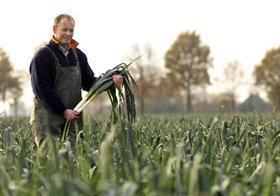
Leading vegetable seed developer Nunhems, part of Bayer CropScience, has released what it describes as the 'next generation' of leek varieties that have been developed in order to improve crops by offering better uniformity, longer storage times, higher shaft density and stronger resistance to diseases and pests.
The first hybrids - Megaton for spring and summer and Belton for autumn - are available now and will be followed by a series of new varieties throughout 2009.
According to Kathleen Dejaeghere, Nunhems’ crop sales manager for leeks, are well on the way to setting a new standard in the worldwide leek market.
'The next generation is clearly a result of our proximity to the customer,' says Ms Dejaeghere. 'Within the leek team we combine market knowledge with crop development skills and operational expertise for higher yield and better quality.'
The new early hybrid Megaton is understood to reduce the risk on bolting, which is when a vegetable goes to seed.
Nunhems was the first company to market leek hybrids in 1995, with product developments and improvements continuing ever since as the potential threats to leek crops such as fungi, insects and bacteria have increased.
One of the biggest threats to leek production is the bacterium Pseudomonas syringae. 'There is still not much you can do against this bacterium from a growing perspective, comments Ms Dejaeghere. 'The more important task for vegetable seed companies is to come up with a sustainable solution and Nunhems has done just that. The new generation varieties offer a higher level of resistance against this elusive bacterium.'
In addition, the variety is apparently easier to clean, something which Nunhems says will be an advantage for its customers.



